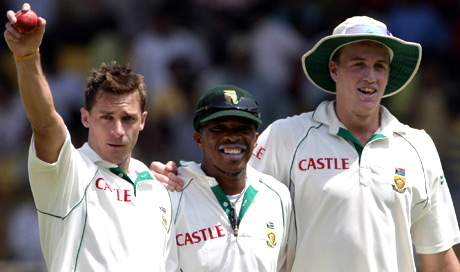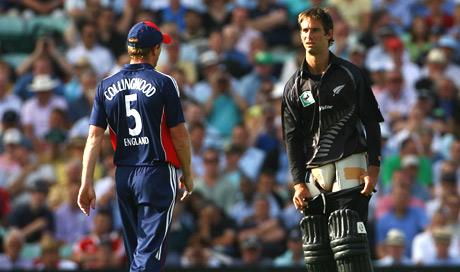
Of all the days to run into Tim Lamb. It was Wednesday evening, at Lord’s, the occasion a party to celebrate the 100th issue of the Observer Sport Monthly magazine. Only a few hours earlier, the ECB, of which Lamb had been chief executive until 2004, had announced they were cutting ties with Zimbabwe. I couldn’t resist.
After a few pleasantries, I slipped in the predictable question about Zimbabwe - what had he made of the day’s momentous announcement? It would be inappropriate to quote chapter and verse. It was a social occasion, I wasn’t taking notes and in any case I can’t remember exactly what was said. But the words wry smile do come to mind. As does the expression ‘rock and a hard place’.
The Honourable Tim Lamb (Oxford University, Middlesex, Northamptonshire) was a sitting duck for media flak as a an administrator. He worked for Middlesex, the old TCCB and then its reincarnation the ECB. By the time he departed, not exactly on his own terms, there weren’t many mourning his passing. He was portrayed as weak, ineffectual and worse, paying the price ultimately for the Zimbabwe cloud that has hung over English – and world – cricket for half a decade.
The fundamental difference between Lamb’s time and Wednesday lunchtime is Government intervention. That and the fact that South Africa finally started shouting over their neighbour’s fence. In late 2002, Clare Short MP stood up in the House of Commons and said England should not go to Zimbabwe in the forthcoming World Cup, six weeks away. This was not so much cat among pigeons as leopard in the chicken pen.
Months earlier Lamb, he recalled the other night, had alerted senior Government officials to the possibility of a ’situation’ with England’s Harare fixture. Your call, old boy, was the unhelpful message from Tony Blair’s administration. And so it went on. Media, public (and then players’) opinion piled up against England going to Zimbabwe. The British Government didn’t want to know, nor did the ICC. If the ECB pulled out of the game, they would be in breach of their various ICC contracts, if they played they risked doing irreparable harm to the image of the game in the UK by appearing to condone Mugabe’s murderous regime.
After much toing and froing at the Cullinan Hotel in Cape Town, England pulled out and paid a financial price. Lamb told me about the one-to-one meeting he had with Malcolm Speed, the ICC chief, where he told him the news. Lamb didn’t divulge Speed’s reaction but I’m guessing it wasn’t along the lines of ‘we’re right behind you, Tim’.
It’s when you hear stories like this, from the horse’s mouth so to speak, that you realise these are real people having to make real decisions, being pulled from pillar post by all manner of unpalatable political and financial vested interests. I’m no apologist for Lamb but his was a vastly different position to that of his successor David Collier who received clear Government instruction that they were not to receive Zimbabwe’s cricketers next summer. That’s all the ICC needs to know to tick their ‘acceptable non-compliance’ box.
If only Tony Blair had found the time, in between invading Iraq, to write a similar letter back in 2003. Interestingly, Alistair Campbell, Blair’s ex-spin doctor not the former Zimbabwe captain, was a guest at the OSM party too. I didn’t get to chat to him.
PS: for anyone who’s interested, Tim Lamb now runs the Central Council for Physical Recreation which sounds an all together less stressful occupation.
John Stern is editor of The Wisden Cricketer







